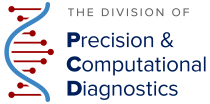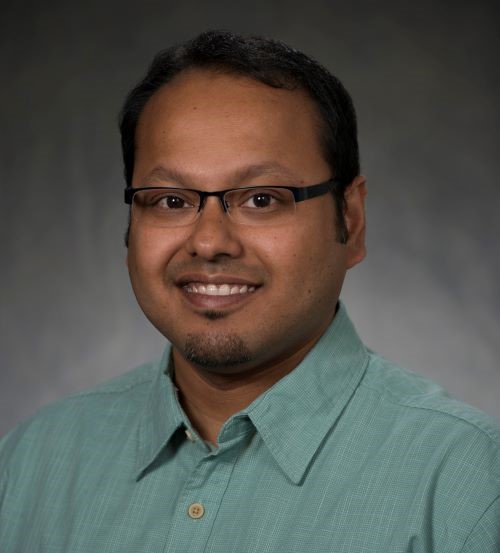Precision and Computational Diagnostics

The Division of Precision and Computational Diagnostics (PCD) encompasses four laboratories: the Center for Personalized Diagnostics (CPD), the Clinical Cancer Cytogenetics Laboratory, the Molecular Pathology Laboratory, and the Rittenhouse Molecular Laboratory. Together these laboratories provide integrated and cutting-edge precision molecular and genomic diagnostic services for Penn Medicine patients. The Division of PCD is also home to the ACGME-accredited Molecular Genetic Pathology (MGP) fellowship program.
The Division focuses on chromosomal and nucleic acid abnormalities that allow Precision Medicine initiatives to target therapies to an individual’s specific disease, resulting in improved outcomes. The growing reliance on traditional molecular and next generation sequencing (NGS)-based assays represents a potential paradigm shift in the practice of pathology, and Penn Medicine is well-positioned to offer its patients access to this exciting and growing field. Relying upon the clinical and scientific excellence of its faculty and staff, the Division remains committed to Penn Medicine's tripartite mission to:
- Provide outstanding patient care.
- Provide for the education of physicians and scientists to carry on Penn's legacy of excellence.
- Contribute toward research that results in discoveries that advance science and translate into new treatment options for patients.
- Center for Personalized Diagnostics: Offers advanced genomics testing for cancer patients.
- Clinical Cancer Cytogenetics Laboratory: Performs karyotype and Fluorescent In Situ Hybridization (FISH) testing for cancer patients.
- Molecular Pathology Laboratory: Provides a variety of targeted testing in the areas of inherited disorders, infectious disease, identify testing, and cancer diagnostics.
- Rittenhouse Molecular Laboratory: Offers high-throughput testing with a focus on infectious diseases, such as COVID-19.
Accordingly, our clinical laboratories utilize state-of-the-art instrumentation to deliver sophisticated genomic testing for a broad spectrum of cancers, including hematologic and solid tumors, infectious diseases, and constitutional disorders. Educating the next generation of clinicians about this highly complex, rapidly evolving field is vitally important. As such, genomic medicine is strongly emphasized in the training of all Departmental residents and fellows, not just those completing an MGP fellowship. Research in the Division also spans the gamut from sponsored basic research to translational and clinical research.
The PCD laboratories are accredited and certified by the College of American Pathologists (CAP) and Clinical Laboratory Improvement Amendments (CLIA) and licensed by the State of Pennsylvania to conduct high-complexity clinical molecular laboratory tests.
Our Team: Faculty
 |
Vivianna Maia Van Deerlin, MD, PhD Professor of Pathology and Laboratory Medicine Interim Director, Division of Precision & Computational Diagnostics |
|||||
|
|
||||||
|
||||||
 |
Jennifer J.D. Morrissette, PhD Associate Professor of Clinical Pathology and Laboratory Medicine Interim Director, Center for Personalized Diagnostics |
|||||
| Dr. Morrissette is currently serving as Interim Director of the Center for Personalized Diagnostics, Laboratory Director for the Penn | ||||||
|
Medicine CytoGenomics Laboratories and Scientific Director of the Clinical Cancer Cytogenetics Laboratory. She is dual board certified in Clinical Cytogenetics and Clinical Molecular Genetics by the American Board of Medical Genetics and Genomics (ABMGG). She received her PhD in Molecular Biology and Genetics from the State University of New York at Buffalo, completed a postdoctoral fellowship in Molecular Genetics at Harvard Medical School, and completed the ABMGG Fellowship at Children's Hospital of Philadelphia. Her interests are in the application of genomic technologies in oncology for patient management and using genomics to support personalized therapy. |
||||||
 |
Simon Chen, MD Assistant Professor of Clinical Pathology and Laboratory Medicine Dr. Chen obtained his medical degree from the Washington University School of Medicine in St. Louis, and completed his residency in Anatomic and Clinical Pathology and fellowships in Molecular Genetic |
|||||
|
Pathology and Surgical Pathology at Stanford Health Care. He studies the application of molecular genetic pathology to the study of cancer, and in particular the use of molecular genetic biomarkers to support the latest diagnostic and therapeutic innovations in oncology, hematology, anatomic pathology, and hematopathology. |
||||||
 |
Robert Babak Faryabi, PhD |
|||||
| Dr. Faryabi is a member of the Abramson Family Cancer Research Institute. After postdoctoral training with Dr. Andre Nussenzweig at | ||||||
|
the NIH Laboratory of Genome Integrity, Dr. Faryabi joined the Perelman School of Medicine at the University of Pennsylvania in June of 2015. His lab explores the genome-wide signatures of replicative stress and the contributions of replication stress-induced genomic lesions to hematological malignancies. The lab employs a combined experimental-computational approach, and develops computational methods based on combinations of big data analytics, mathematical modeling and machine learning algorithms to integrate and interrogate high-dimensional experimental data sets. |
||||||
 |
Malay Haldar, MD, PhD Associate Professor of Pathology and Laboratory Medicine HUP Pathology Residency Program Co-Director, Physician-Scientist Pathway (PSP) |
|||||
|
|
||||||
 |
Warren S. Pear, MD, PhD Gaylord P. and Mary Louise Harnwell Professor Director, Division of Cancer and Immunobiology |
|||||
|
|
||||||
 |
Kyle G. Rodino, PhD, D(ABMM) Assistant Professor of Clinical Pathology and Laboratory Medicine Assistant Director, Clinical Microbiology Laboratory Director, Rittenhouse Molecular Laboratory |
|||||



